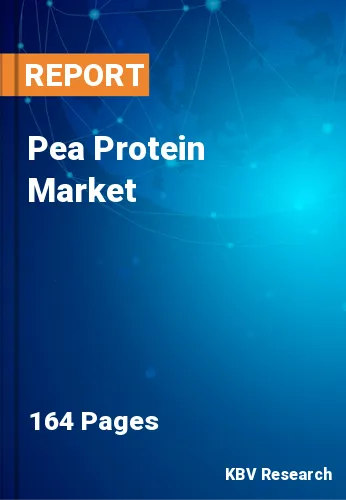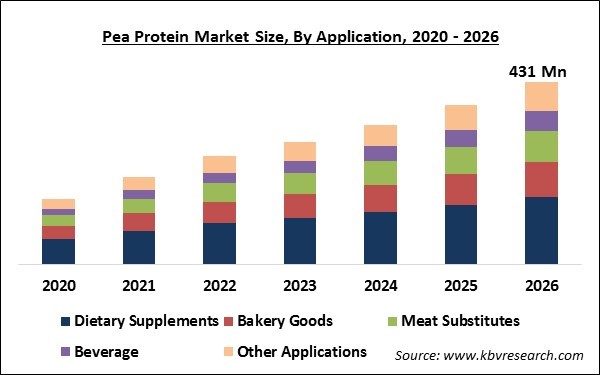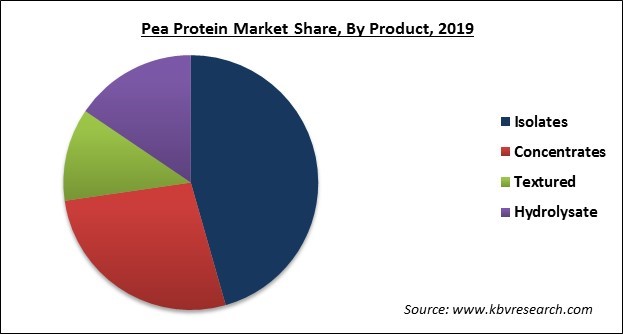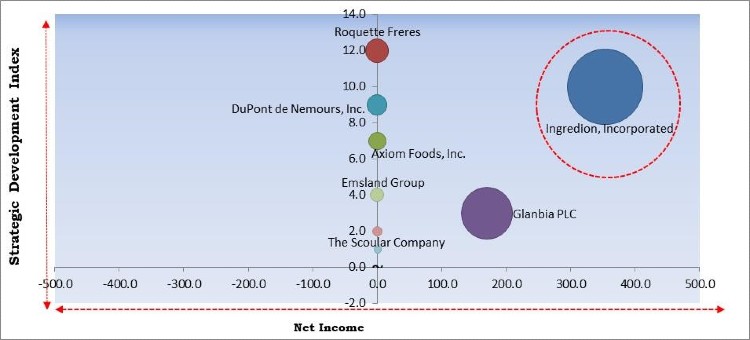
The Global Pea Protein Market size is expected to reach $431 Million by 2026, rising at a market growth of 18.6% CAGR during the forecast period. Pea protein refers to the protein obtained from split peas which is extensively utilized in a broad range of food items like fast foods, cereals, meal replacements shakes, and energy bars.
Meat is regarded as the major source of protein for years. Though, in past few years, plant-based proteins are highly popular in the thriving food & beverage sector, owing to the increasing health and environmental issues. Though, assuring the meat-free ‘meat’ was a long dream among customers - lack quality and variety - currently, the feasible options to environmentally hazardous meat are gaining massive traction. In addition, the ‘fake meat’ revolution is taking place in the global food industry, and pea protein is gaining massive prominence among makers of meat, dairy food, and seafood alternatives.
Increasing demand for the product due to the rising consumer awareness with respect to the consumption of a healthy diet and living healthy lifestyles is expected to the growth of the global pea protein market. Moreover, the market would witness bright growth prospects due to many factors including rising product development regarding manufacturing that carries out particular functions such as energy balance, weight loss, and repairing of muscle. The protein is obtained from several kinds of pea varieties, such as green, chickpeas, and dry, available in textured, concentrates, and isolate forms.

Rising cases of COVID-19 in North America, Europe, and the Asia Pacific combined with severe government lockdown norms would slow down the food & beverage industry. The supply chain can be disrupted and raw materials can witness shortage due to the stringent norms and limitations on trade, shipping, and social distancing guidelines.
Based on Application, the market is segmented into Dietary Supplements, Bakery Goods, Meat Substitutes, Beverage and Other Applications. The meat substitutes segment would exhibit a higher growth rate over the forecast years. Increasing health issues, like obesity and diabetes, have encouraged many individuals to adopt vegan dietary habits. Animal rearing has a remarkable impact on the natural resources of the world and is the reason behind global warming to a certain extent. Though, this factor has not been measured, increasing awareness about this factor is expected to switch food habits to a more vegetarian diet, hence boosting the growth of the meat substitutes market. This trend would support the integration of pea protein as meat analogs.

Based on Product, the market is segmented into Isolates, Concentrates, Textured and Hydrolysate. In 2019, the global pea protein market was dominated by the isolates product segment. Isolates are extensively utilized as nutritional supplements in meat items, fruit mixes, energy drinks, and bakery products as they have good emulsification and non-allergic properties. Growth of the sports nutrition sector in the established nations such as the US, the UK, and Germany, on account of the introduction of new products by Amway and Cadbury in the energy mix segment, would fuel the demand for the product.
| Report Attribute | Details |
|---|---|
| Market size value in 2019 | USD 168.9 Million |
| Market size forecast in 2026 | USD 431 Million |
| Base Year | 2019 |
| Historical Period | 2016 to 2018 |
| Forecast Period | 2020 to 2026 |
| Revenue Growth Rate | CAGR of 18.6% from 2020 to 2026 |
| Number of Pages | 164 |
| Number of Tables | 294 |
| Report coverage | Market Trends, Revenue Estimation and Forecast, Segmentation Analysis, Regional and Country Breakdown, Companies Strategic Developments, Company Profiling, Competitive Landscape |
| Segments covered | Application, Product, Region |
| Country scope | US, Canada, Mexico, Germany, UK, France, Russia, Spain, Italy, China, Japan, India, South Korea, Singapore, Malaysia, Brazil, Argentina, UAE, Saudi Arabia, South Africa, Nigeria |
| Growth Drivers |
|
| Restraints |
|

Free Valuable Insights: Global Pea Protein Market to reach a market size of $431 Million by 2026
Based on Regions, the market is segmented into North America, Europe, Asia Pacific, and Latin America, Middle East & Africa. In 2019, North America emerged as the leading region of the global pea protein market. The pea protein market in the North American region is anticipated to propel by the increasing demand for gluten-free items, growing concerns in terms of Cardiovascular Diseases (CVDs) caused by red meat consumption, and strong development of the sports nutrition sector in the region.
The major strategies followed by the market participants are Product Launches. Based on the Analysis presented in the Cardinal matrix; Ingredion, Incorporated is the major forerunner in the Pea Protein Market. Companies such as Roquette Freres, DuPont de Nemours, Inc., Axiom Foods, Inc., Emsland Group, and Glanbia PLC are some of the key innovators in the market.
The market research report covers the analysis of key stake holders of the market. Key companies profiled in the report include Glanbia PLC, DuPont de Nemours, Inc., Ingredion, Incorporated, Roquette Freres, The Green Labs LLC, Fenchem Biotek Ltd., A&B Ingredients, Inc., The Scoular Company, Axiom Foods, Inc., and Emsland Group.
By Application
By Product
By Geography
The global pea protein market size is expected to reach $431 million by 2026.
Increasing adoption of a vegan diet are driving the market in coming years, however, Absence of awareness about the benefits of pea protein have limited the growth of the market.
Glanbia PLC, DuPont de Nemours, Inc., Ingredion, Incorporated, Roquette Freres, The Green Labs LLC, Fenchem Biotek Ltd., A&B Ingredients, Inc., The Scoular Company, Axiom Foods, Inc., and Emsland Group.
The expected CAGR of the pea protein market is 18.6% from 2020 to 2026.
The Asia-Pacific would showcase the faster growth rate in the pea protein market throughout the forecast period.
Our team of dedicated experts can provide you with attractive expansion opportunities for your business.
